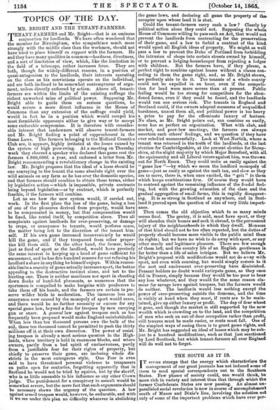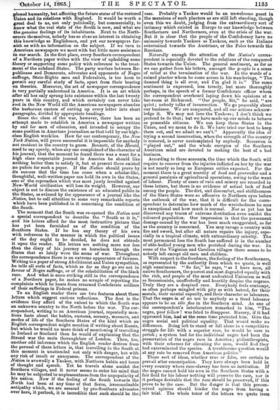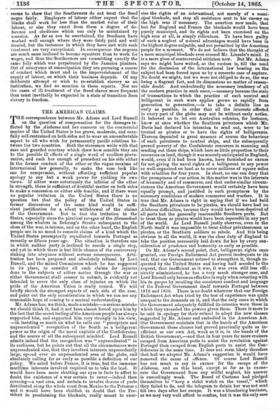THE SOUTH IS IT IS.
IT seems strange that the energy which characterizes the management of our great journals has not induced some of them to send special correspondents out to the Southern States. Few phases of society could, one would think, be more rich in variety and interest than that through whieh the former Confederate States are now passing. An almost un- paralleled social revolution is now in course of accomplishment south of Mason and Dixie's line, involving the solution not only of some of the importaut problems which have ever per- plexed humanity, but affecting the future statue of the restored Union and its relations with England. It would be worth a great deal to us, not only politically, but commercially, to know what the real state of the South is now, and what are the genuine feelings of its inhabitants. Next to the North- erners themselves, nobody has so close an interest in obtaining this knowledge as Englishmen, and yet our newspapers fur- oish us with no information on the subject. If we turn to American newspapers we meet with but little more assistance in our search. In the first place, every Southern correspondent of a Northern paper writes with the view of upholding some theory or supporting some policy with reference to the treat- .ment of the subdued States. The party warfare between Re- publicans and Democrats, advocates and opponents of Negro -suffrage, State-Rights men and Federalists, is too keen to permit any careful study of facts, apart from their bearing on theories. Moreover, the art of newspaper correspondence is very partially understood in America. It is an art which after all has only sprung into existence within the last twenty sears in this country, and which certainly can never take .root in the New World till the American newspapers abandon the barbarous custom of cutting up every letter into short paragraphsj divided by appropriate headings. Since the close of the war, however, there has been an attempt made to establish in America a newspaper written by and for men of education, and intended to occupy the same position in American journalism as that held by our high- -class English weeklies. How far our contemporary, the New York Nation, will prove successful it is impossible for anybody not resident in the country to guess. Bennett, of the Herald, aged to say openly, when any one complained of the character of his journal, that the moment he found there was a want for a -high class respectable journal in America he should like nothing better than to satisfy it, but at present there existed .no public for such a paper. If the Nation should prove by its success that the time has come when a scholar-like, thoughtful, well-written paper can hold its own in the States, one of the reproaches which was most justly levelled against New-World civilization will lose its weight. However, our -object is not to discuss the existence of an educated public in the States' as evinced by the appearance of a journal like the _Nation, but to call attention to some very remarkable reports which have been published in it concerning the condition of the South.
The moment that the South was re-opened the Nation sent .a special correspondent to describe the "South as it is," .and his letters afford far the most instructive picture that has yet been furnished us of the condition of the -Southern States. If he has any theory of his own with reference to the manner in which the political issues of the day ought to be decided, he does not obtrude it upon the reader. His letters are nothing more nor less than the diary of his journey on horseback through the -States that so lately were the scene of war. Throughout the correspondence there is an extreme appearance of fairness. Writing to a paper of strong Abolitionist and Union sympathies, he tells all sorts of facts, which as far as they go are not in favour of Negro suffrage, or of the rehabilitation of the black race. And what is more striking still in the correspondence of a Northern paper, he makes no scruple of reporting the -complaints which he hears from returned Confederate soldiers of their sufferings in Federal prisons.
To an English reader there are two features about these letters which suggest curious reflections. The first is the evidence they afford of the extent to which the South was -an unknown country to the North before the war. The cor- respondent, writing to an American journal, repeatedly men- tions facts about the habits, customs, scenery, manners, and modes of life of the Southern States of the kind which an English correspondent might mention if writing about Russia, .but which he would no more think of mentioning if travelling in Ireland or Scotland than he would of explaining that the Strand was the main thoroughfare of London. Then, too, another odd inference which the English reader derives from -the perusal of these letters is, that travelling in the South at this moment is unattended not only with danger, but with any risk of insult or annoyance. The correspondent of the Nation is avowedly a Yankee, with Northern habits and tones of thought and speech. Yet he travels alone amidst the Southern villages and it never seems to enter his mind that _he may be subjected to unpleasantness from the unpopularity of his nation. Now if the feeling of the South towards the North had been at any time of that fierce, irreconcileable antipathy which, we are assured by pro-Southern advocates over here, it partook, it is incredible that such should be the ease. Probably a Yankee would be an unwelcome guest in the mansions of such planters as are still left standing, though
even this we doubt, judging from the extraordinary sort of intimacy which existed in Europe to our knowledge between Southerners and Northerners, even at the crisis of the war.
But it is clear that the people of the Confederacy have no animosity towards Yankees as Yankees, each as the Italians entertained towards the Austrians, or the Poles towards the Russians.
Naturally enough the attention of the Nation's corres- pondent is especially devoted to the relations of the conquered
States towards the Union. The general sentiment, as far as we can gather from his letters, amongst the people is a sense of relief at the termination of the war. In the words of a ruined planter whom he came across in his wanderings, "The damned thing is all over, and I'm glad it is." The same sentiment is expressed, leas tersely, but more thoroughly perhaps, in the speech of a former Confederate officer whom
the correspondent overheard laying down his opinions at a bar-room at Richmond. "Our people Sir," he said, "are
quiet ; nobody talks of insurrection. *e go peaceably about our business. We are conquered, and all our actions acknow- ledge it. We may not love the Yankees ; I don't think we pretend to do that; but we have made up our minds to behave as peaceable citizens. We can keep these States in the Union, and we mean to do it. We have tried our beat to keep them out, and we admit we can't." Apparently the idea of trying a second insurrection, when the strength of the country , is restored, is never contemplated by anybody. Secession is "played out," and the whole energies of the Southern American mind are devoted to making the best of a bad business.
According to these accounts, the time which the South will require to recover from the injuries inflicted on her by the war is not nearly so long as European critics expected. For the
moment there is a great scarcity of food and provender and a general paralysis of agricultural operations, owing to the want
of labour. Plenty of cases of ruin and misery are recorded in these letters, but there is no evidence of actual lack of food among the people. The dirt, and discomfort, and shiftlessness of the Slave States were so offensive to Northern eyes before the outbreak of the war, that it is difficult for the corre- spondent to determine how much of the wretchedness he sees
is exceptional and how much is normal. Nor as yet has he
discovered any traces of extreme destitution even amidst the coloured population. Our impression is that the permanent damage caused by the war has been much exaggerated, as far as the country is concerned. You may ravage a country with fire and sword, but after all nature repairs the injury, espe- cially in a tropical climate, with extraordinary celerity. The most permanent loss the South has suffered is in the number of able-bodied young men who perished during the war. In some of the Virginian and Carolina villages there seems to be nobody left except old men and children.
With respect to the freedmen, the feeling of the Southerners, as represented by the authority from which we quote, is well nigh unanimous. "So far,' he says, "as I have seen, all native Southerners, the poorest and most degraded equally with the rich, and people of the most undoubted Unionism as well as Secessionists, unaffectedly and heartily despise the negroes. Truly they are a despised race. Everybody feels contempt, as often perhaps mingled with pity as with hatred, for their morals, their mental capacity, and their character as labourers.
That the negro is of no use to anybody as a freed labourer appears to be an idie fire in the Southern mind. As one of the correspondent's interlocutors remarked to him, "The negro, poor fellow ! was fated to disappear. Slavery, if it had oppressed him, hal at the same time protected him. Give the negro social and political equality. That would make no difference. Being left to stand or fall alone in a competitive struggle for life with a superior race, he would be sure to perish ; a system bad for the individual negro had been the preservation of the negro race in America ; philanthropists, with their schemes for elevating the man, would find they had exterminated the species. A troublesome question would at any rate be removed from American polities."
These sort of ideas, whether true or false, are certain to prevail after emancipation. They have always been held in every country where race-slavery has been an institution. If the negro cannot hold his own in the Southern States with a fair field for his labour nothing will preserve the race nor is
it perhaps desirable that the race should be preserved, if this prove to be the case. But the clinger is that this precon-
ceived opinion should hinder the negro from having a fair trial. The whole tenor of the letters we quote from. seems to show that the Southerners do not treat the freed negro fairly. Employers of labour either expect that the blacks shall work for less than the market value of their 'labour, or else they exact from them a degree of de- ference and obedience which can only be maintained by coercion. As far as can be ascertained, the freedmen have worked well enough where they were fairly paid and well treated, but the instances in which they have met with such treatment are very exceptional. In consequence the negroes are mach more inclined to become squatters than to work for wages, and thus the Southerners are committing exactly the same folly which was perpetrated by the Jamaica planters. Out of annoyance at emancipation they are pursuing a course of conduct which must end in the impoverishment of the
. supply of labour, on which their business depends. Of any • deliberate attempt or wish to re-establish slavery as an institution, we find no mention in these reports. Nor are the cases of ill-treatment of the freed slaves more frequent than must inevitably be expected in a state of transition from slavery to freedom.
































 Previous page
Previous page